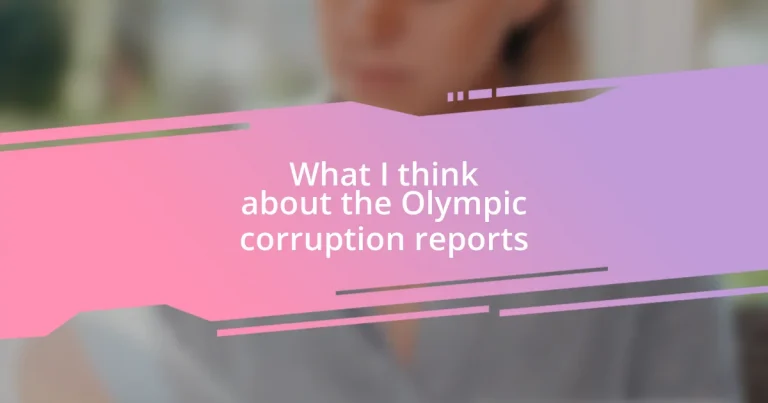Key takeaways:
- Corruption in the Olympics is systemic, involving bribery and misuse of funds, which undermines athlete integrity and public trust.
- Key scandals include the 2002 Salt Lake City bribery, Rio 2016 financial mismanagement, and Tokyo 2020 bidding irregularities.
- Future integrity initiatives must focus on education, technological transparency, and community involvement to restore trust and accountability in Olympic governance.
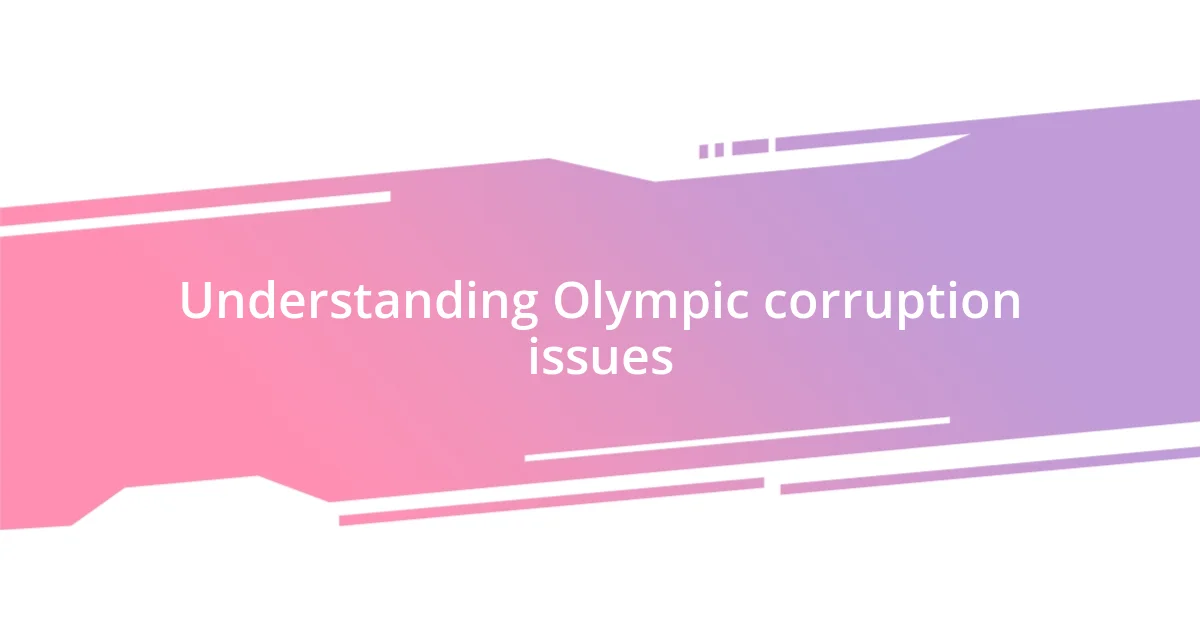
Understanding Olympic corruption issues
Corruption in the Olympics is a multifaceted issue that often revolves around bribery, favoritism, and misuse of funds. I remember attending a local viewing party during the Games a few years back. It was disheartening to hear fans express their love for the athletes while simultaneously feeling slighted by the governing bodies that seem more concerned with money than integrity. This dichotomy made me reflect: how can we cheer for our heroes when the very platform they compete on is shrouded in controversy?
The reports of corruption highlight not just a few isolated incidents but a systemic problem within the Olympic framework itself. When I first learned about the infamous scandals surrounding bids for hosting the Games, it struck me how deeply rooted these practices are. It made me wonder, how can we trust an institution that allows such malfeasance to thrive? The more I dug into the details, the more layers I uncovered, from the auction-like bidding processes to the silence surrounding misconduct.
One particularly troubling aspect is the impact of these corrupt practices on the athletes and their pursuit of excellence. I often think about how hard these competitors train and sacrifice, only to be caught in the crossfire of an organization’s questionable ethics. Isn’t it tragic that their dreams can be tainted by those who manipulate the system for personal gain? This dynamic not only undermines the spirit of competition but also shadows the achievements of the very athletes we ought to celebrate.
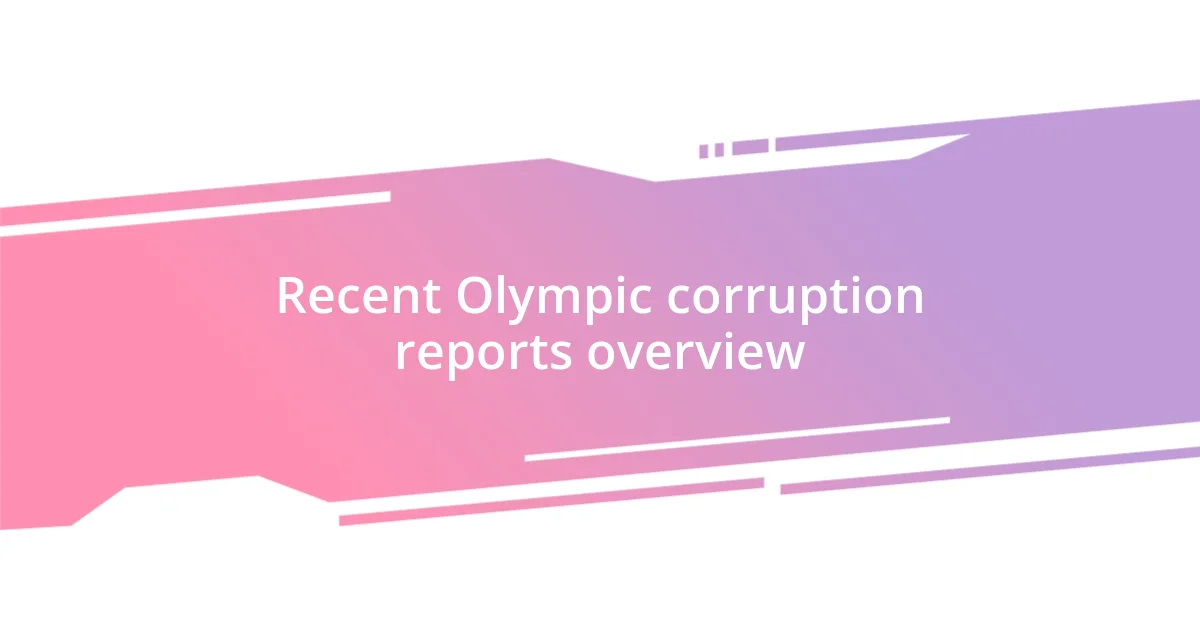
Recent Olympic corruption reports overview
Recent reports have shed light on the ongoing corruption within the Olympic movement, revealing troubling patterns that can’t be ignored. For instance, I stumbled upon an article discussing how certain cities resorted to dubious payments to secure their bids, often leaving local taxpayers with financial burdens they never anticipated. It’s unsettling to realize that behind the glamorous facade of the Games lies a world where integrity seems to be negotiable.
- Findings indicate that several high-ranking officials face allegations of bribery during bid processes.
- Investigations have revealed misuse of funds intended for athlete support and development.
- There are growing calls for greater transparency in how financial decisions are made within the International Olympic Committee (IOC).
- Recent analyses show that public trust in the Olympic brand continues to wane amidst these revelations.
It’s hard not to feel a sense of betrayal every time I read about these issues. I think of the athletes, the very essence of the Olympics, who pour their heart and soul into their sports, only to find their accomplishments overshadowed by the actions of those in power. This disconnect between the ideals of the Games and the reality we often see is both frustrating and disheartening. It makes me reflect on what we value in sports and how we can work towards restoring that lost integrity.

Key scandals in Olympic history
One of the most notorious scandals in Olympic history involved the 2002 Salt Lake City Winter Games. I remember hearing the shockwaves reverberate through sports circles when it was revealed that bid officials had engaged in extensive bribery. What strikes me as particularly aggravating is that these unethical practices affected the very spirit of the Olympics, which is supposed to promote fairness and unity.
Another significant scandal is the corruption allegations related to the Rio 2016 Games. The financial mismanagement that surfaced left many in Brazil questioning their investments. I couldn’t help but feel a mix of anger and sadness; the host country poured its heart and resources into welcoming the world, while behind the scenes, officials were pocketing funds that could have supported local communities.
A more recent example is the claims surrounding the Tokyo 2020 Games, where reports suggested dubious dealings during the bidding process, raising questions about transparency. As I read the findings, I felt a sense of helplessness. These revelations tarnish the athletes’ efforts, forcing us to confront uncomfortable truths about the systems that govern one of the world’s most celebrated sporting events.
| Scandal | Year |
|---|---|
| Salt Lake City bribery scandal | 2002 |
| Rio 2016 financial mismanagement | 2016 |
| Tokyo 2020 bidding claims | 2021 |

Impact of corruption on sports
The impact of corruption on sports is profound and multi-faceted. I’ve often found myself wondering, how can young athletes stay inspired when their idols face such turmoil? It feels like a betrayal; years of hard work and dedication can be overshadowed by the actions of officials who seem to put personal gain above the spirit of competition.
Moreover, the misuse of funds intended for athlete support has dire consequences. I recall a heart-wrenching story of a promising gymnast who had to drop out of training camps due to lack of financial support, funds that were supposed to heighten her chances at the Olympics. When such a talent is stifled because of greed, it’s not just a sports issue—it’s a loss for society as a whole.
And then there’s the erosion of public trust. I remember speaking with a friend who’s an avid sports fan, and he expressed his disillusionment with the Olympics after learning about these corruption reports. It’s painful to see the passion for sports fade due to these scandals, making me question: how do we rebuild that trust? The integrity of sports should be unwavering; otherwise, what are we cheering for?
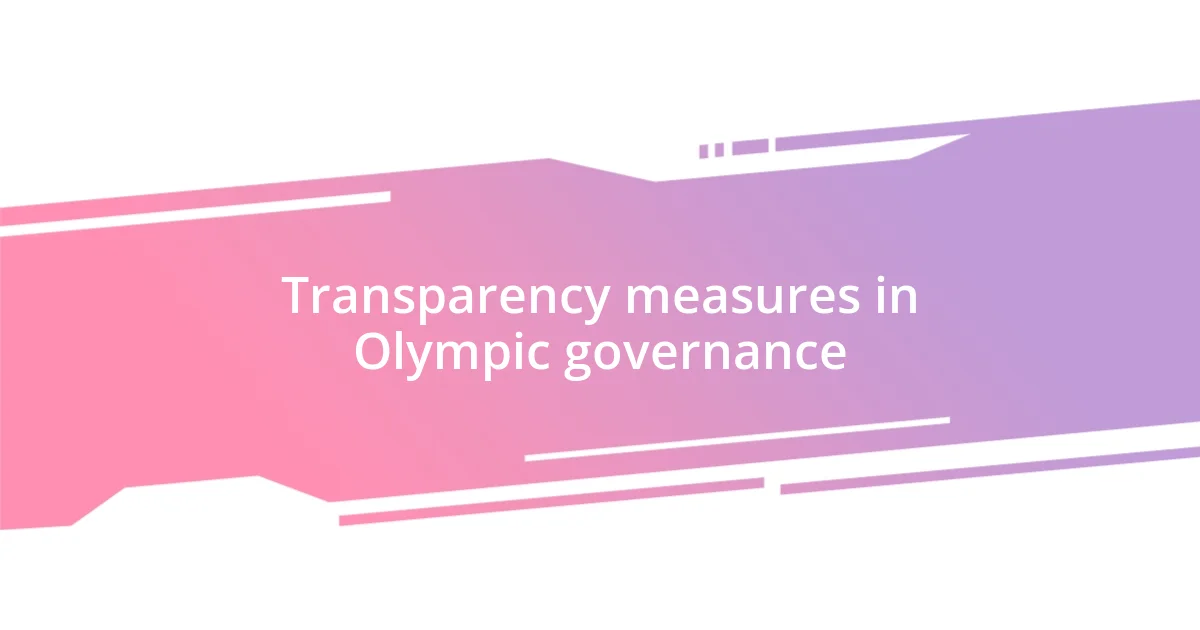
Transparency measures in Olympic governance
Translating the spirit of the Olympics into effective governance requires a commitment to transparency. I’ve watched as various organizations, including the International Olympic Committee (IOC), have begun implementing measures like regular audits and open financial reporting to mitigate corruption. This progression feels essential, yet I often wonder: are these efforts enough to truly change the entrenched culture of secrecy?
One particularly interesting initiative has been the establishment of an independent ethics committee that holds officials accountable for their actions. I recall reading about how this committee scrutinizes decisions and practices, creating a much-needed layer of oversight. However, I still think about whether this oversight alone can assure stakeholders of genuine improvements. Will the fear of repercussions genuinely curb the misconduct, or is it merely a band-aid over a much deeper issue?
I can’t help but feel a bit hope-infused when I see the push for whistleblower protections in Olympic governance. Protecting those who expose wrongdoing is crucial and sends a message that integrity is valued. Yet, do we truly have a safe environment for whistleblowers in the Olympics? From my perspective, it’s a step in the right direction, but we must continue advocating for this culture shift, ensuring that transparency becomes the norm rather than the exception.
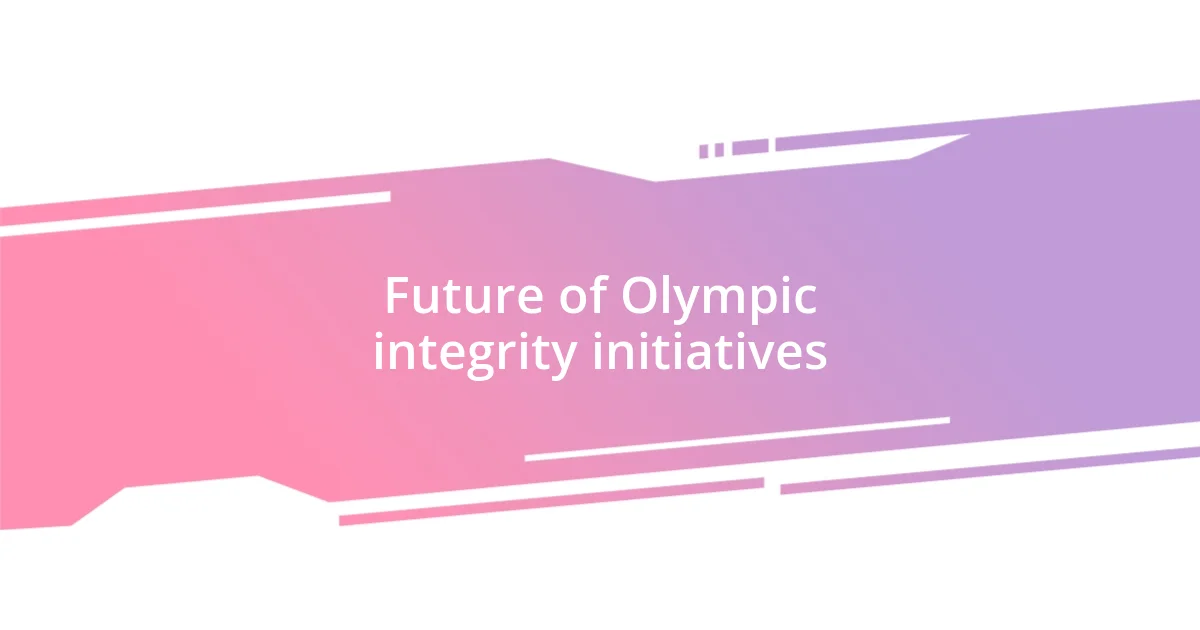
Future of Olympic integrity initiatives
The future of Olympic integrity initiatives appears to hinge on a cultural transformation within the sports governing bodies. I remember attending a sports conference where a panel discussion shocked me; speakers spoke candidly about a “bystander effect” that too often paralyzes reform. I couldn’t help but think: how can we empower stakeholders to be proactive rather than passive? It’s clear that fostering an environment where everyone feels responsible for integrity is essential.
I’ve witnessed the power of education in other areas of sport. When athletes and officials are educated about ethical practices and the impact of their decisions, it can ignite a desire for change. For instance, I recall a workshop that emphasized the importance of good governance practices, and it was inspiring to see participants come alive with ideas on accountability. Implementing similar educational initiatives across all Olympic sports could bring about a shift in mindset that echoes well beyond the arenas.
Ultimately, I believe technology can play a pivotal role in enhancing transparency and integrity in the Olympics. The idea of using blockchain to track funding and athlete support initiatives fascinates me. Just imagine how secure and transparent the financial flow could become! Can you envision a future where every dollar spent is traceable, making it nearly impossible to misappropriate funds? This approach could restore public faith in the Olympic movement, turning it into not just an event, but a beacon of accountability.

My personal perspective on solutions
When considering solutions to the corruption reports within the Olympic framework, I genuinely believe that establishing a robust system of checks and balances is imperative. During a recent discussion with fellow sports enthusiasts, we mused about how much more effective governance could be if we had third-party auditors reviewing not just the finances, but also the ethical decisions made by officials. Imagine if stakeholders felt reassured every year that their faith in the system wasn’t misplaced. What if these measures could restore some of that lost trust?
Moreover, I think incentivizing good behavior could play a transformative role. I once attended a workshop where participants shared their experiences of being rewarded for positive changes in organizational culture. The excitement in the room was palpable; everyone felt like they were part of something larger than themselves. It struck me that if the IOC could institute rewards for transparency and ethical practices, it could spark a shift. Wouldn’t it be inspiring to see nations competing not just for medals, but also for integrity awards?
Lastly, I often reflect on the importance of community involvement in the Olympic governance process. I remember volunteering at a local sports event and feeling the passion of the community, which made it clear that people care deeply about the integrity of sports. I can’t help but wonder: what if we could harness that energy on a global scale? Engaging fans, athletes, and local communities in meaningful dialogue about governance could lead to innovative solutions. After all, a united front can amplify our voices and demand the accountability that the Olympics so desperately need.












